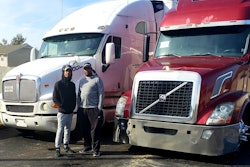
Previously in this series: The expansion challenge: Mastering preparation for the unpredictable
For all the differences between a mega-fleet and an expanding one-truck owner-operator, both share a common problem: finding and keeping dependable drivers.
When Overdrive polled current and past small-fleet owners about the challenges associated with expanding beyond one truck, almost two-thirds named recruitment and retention their No. 1 issue.
Small fleets often find it difficult to afford and manage health insurance benefits, discount buying groups and other perks that larger entities easily can afford. Membership in organizations such as the National Association of Small Trucking Companies and Owner-Operator Independent Drivers Association can help in some of those areas, particularly when it comes to discounts on fuel and other expenses.
There are other challenges with recruitment and retention, says Marco Ardila, the young chief executive officer of South Florida-based Firstway Logistics Trucking.
“Insurance won’t accept less than two years’ experience,” he says. Finding good drivers in the Miami area, well-known as a sparse market for outgoing freight, “is very difficult. Even those with experience seem to not be very good drivers. They don’t contribute to keeping up with the equipment, even something as simple as changing a light. We’re always coming across those obstacles.”

Expecting turnover, “I’m always keeping eyes out for another driver,” says small-fleet owner Dave Marti. He attributes his success in attracting and keeping employee drivers to above-average compensation, getting operators home most nights and paying close attention to prospective drivers’ background and work ethic.
Midnight Xpress’ Andre Jackson offers a cautionary tale about background research on any prospective driver. The first driver Jackson and his business partner employed to bring their two-truck operation to three stayed just long enough to sock away enough cash to repair his own truck. Had Jackson known the man was an owner-operator, “I wouldn’t have hired him,” he says.
Successful small fleets usually try to promote a family atmosphere, and Daniel Davidson of 20-truck Davidson Trucking is no exception. Several owner-operators in his dry van-hauling fleet have been leased with the company for more than a decade. “I just try to treat guys the way I want to be treated,” he says, and that’s “worked out pretty well.”
 The share of owner-ops who named managing new freight responsibilities and bringing in new business the No. 1 expansion challenge.
The share of owner-ops who named managing new freight responsibilities and bringing in new business the No. 1 expansion challenge.The company has a three-bay shop where it maintains its mostly older power units. It offers the space to owner-operators to “help them keep up on their maintenance, too.” It also offers various Florida timeshares as a benefit to drivers for annual vacation time.
In Marti’s area, surrounded by Illinois farm country, word of mouth has been his principal recruiting tool. It’s based on a close-knit relationship between himself and his drivers and, likely even more, well-above-average pay, he says.
Next in this series: Other expansion challenges: Insurance costs, administrative/compliance burdens, managing customers











